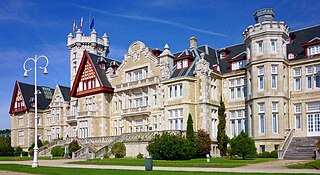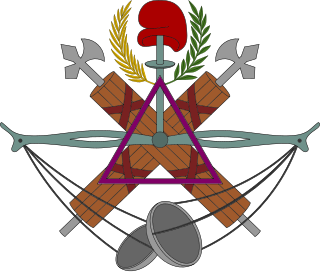Related Research Articles

Cantabria is an autonomous community and province in northern Spain with Santander as its capital city. It is called a comunidad histórica, a historic community, in its current Statute of Autonomy. It is bordered on the east by the Basque autonomous community, on the south by Castile and León, on the west by the Principality of Asturias, and on the north by the Cantabrian Sea.

Santander is the capital of the autonomous community of Cantabria, Spain. It has a population of 172,000 (2017). It is a port city located in the northern coast of the Iberian Peninsula, facing the Cantabrian Sea.

The Radical Republican Party, sometimes shortened to the Radical Party, was a Spanish Radical party in existence between 1908 and 1936. Beginning as a splinter from earlier Radical parties, it initially played a minor role in Spanish parliamentary life, before it came to prominence as one of the leading political forces of the Spanish Republic.
Ricardo López Aranda was a Spanish playwright, born in Santander in 1934. In 1941 his family home was destroyed by the Santander fire. In 1958 he received the National University Theater Prize for his play "Nunca amanecerá" and published a version of Oedipus. In 1960, his work "Cerca de las estrellas" received the National Calderón de la Barca Theater prize and in 1961 the Aguilar prize. The play was presented at the National Teatro María Guerrero that same year and taken to the cinema in 1962. In 1964 he wrote "Noches de San Juan", which received the runner-up of theLope de Vega award and was presented at the María Guerrero National Theater in 1965.

Puente Viesgo is a municipality in Cantabria, Spain. Caves have been discovered near Puente Viesgo that contain rock art and artefacts dating back to the Middle and Upper Paleolithic.
"Himno a la Montaña", or "Himno de Cantabria", is the official anthem of the Spanish autonomous community of Cantabria. It was composed in 1926 by Juan Guerrero Urresti at the behest of the then Provincial Council of Santander, and subsequent arrangements were made by José del Río Sainz, establishing it as the region's official anthem.

The Anjana are one of the best-known fairies of Cantabrian mythology. These female fairy creatures foil the cruel and ruthless Ojáncanu. In most stories, they are the good fairies of Cantabria, generous and protective of all people. Their depiction in the Cantabrian mythology is reminiscent of the lamias in ancient Greek mythology, as well as the xanas in Asturias, the janas in León, and the lamias in Basque Country, the latter without the zoomorphic appearance.

The House de la Vega, Laso de la Vega or Lasso de la Vega is a Spanish noble line from the Kingdom of Castile. The family origins lie in the areas now known as Torrelavega which was established in the Middle Ages. The House of de la Vega was one of the most important families in the territory, which now makes up Cantabria, and they dominated a large amount of the terrain and property between the Torre de la Vega and the Castillo de Argüeso.
El Adalid was a Catholic weekly newspaper published from Torrelavega, Spain, between 1906 and 1917.
Adelante (Forward) was an anarchist weekly workers newspaper published from Santander, Spain 1902–1903. The first issue was published on May 1, 1902. The newspaper survived until the end of March 1903. Adelante was noted for its hostility towards the Spanish Socialist Workers' Party, expressed through the rivalry with the socialist organ La Voz del Pueblo. In total 42 issues of Adelante were published.
El Asón was an independent weekly newspaper published from Ramales, Spain, in the period 1908–1911.
El Trommel was a socialist fortnightly newspaper published from El Astillero, Spain 1906–1908. Diego Pérez Reventún was the editor of El Trommel. El Trommel was printed at La Ideal printing shop in Santander. The price for subscription was 50 centimos per trimester. El Trommel substituted an earlier socialist publication, La Voz del Pueblo.
La Voz del Pueblo was a socialist weekly newspaper from Santander, Spain, published as a regional organ of the Spanish Socialist Workers Party in Cantabria 1898–1905. The newspaper was printed on Sundays. La Voz del Pueblo was the first socialist newspaper in the province. Isidoro Acevedo, Manuel Olivero and Álvaro Ortiz were the directors of La Voz del Pueblo. From October 15, 1899 onwards La Voz del Pueblo was edited at the workshop of the daily El Cantábrico, at Calle de la Compañía.
The following is a timeline of the history of the city of Santander, Cantabria, Spain.

The 1983 Cantabrian regional election was held on Sunday, 8 May 1983, to elect the 1st Regional Assembly of the autonomous community of Cantabria. All 35 seats in the Regional Assembly were up for election. The election was held simultaneously with regional elections in twelve other autonomous communities and local elections all throughout Spain.
José García Vayas was a Spanish soldier who remained loyal to the Second Spanish Republic during the Spanish Civil War (1936–39), during which he commanded the forces in Santander. After the civil war he was forced into exile in France.
The Progressive Republican Party was a Spanish political party created in 1880 by Manuel Ruiz Zorrilla. Ruiz Zorrilla wrote his testament in January 1895 declaring his successor, and thus the reins of the party were passed to José María Esquerdo upon Ruiz Zorrilla's death. The latter helped to create the Republican Union in 1903. Following the death of Esquerdo, the party dissolved in June 1912, integrating into the Reformist Party of Melquíades Álvarez and Gumersindo de Azcárate.
The 54th Division was one of the divisions of the People's Army of the Republic that were organized during the Spanish Civil War on the basis of the Mixed Brigades. It came to operate on the Levante front.

Pilar Zabala Aguirre is a Basque Spanish researcher, writer, and professor at the Universidad Autónoma de Yucatán. Her research interests include taxation in Castile during the 16th century, the colonial history of Yucatán, and the culture of the Basque exile generated by the Spanish Civil War of 1936.

La Marina is the name traditionally given to the area of Cantabria facing the sea, in contrast to La Montaña, its inland part. The differences between the two are orographic, climatic and ecological as well as anthropological and ethnographic. In the case of La Marina, which occupies only a third of the autonomous community, the orography and climate are gentle, the population density is much higher and, therefore, it has a higher level of development. Several of the largest population centers in the region are located in this area, with its capital, Santander, standing out. Chapter 2 of the Regional Land Use Plan of Cantabria defines La Marina as a distinguishable physical environment, with a milder climate and relief than inland Cantabria, and with a higher population development.
References
- ↑ Garrido Martín, Aurora (1990). Cantabria 1902-1923: elecciones y partidos políticos [Cantabria 1902-1923: elections and political parties] (in Spanish). Santander: Universidad de Cantabria, Asamblea Regional de Cantabria. p. 161. ISBN 978-84-87412-09-7. OCLC 25411808.
- ↑ Cueva Merino, Julio de la (1994). Clericales y anticlericales: el conflicto entre confesionalidad y secularización en Cantabria, 1875-1923 [Clerical and anticlerical: the conflict between confessionalism and secularization in Cantabria, 1875-1923] (in Spanish). Santander: Universidad de Cantabria, Asamblea Regional de Cantabria. p. 171. ISBN 978-84-8102-072-4. OCLC 33049611.